Is Vettel now better than Senna?
Ayrton Senna is widely-regarded as the greatest Formula 1 driver of all time, but could world champion Sebastian Vettel be on his way to stealing that mantle off the late, great Brazilian? Edd Straw analyses each driver's key strengths
By Edd Straw
AUTOSPORT F1 editor
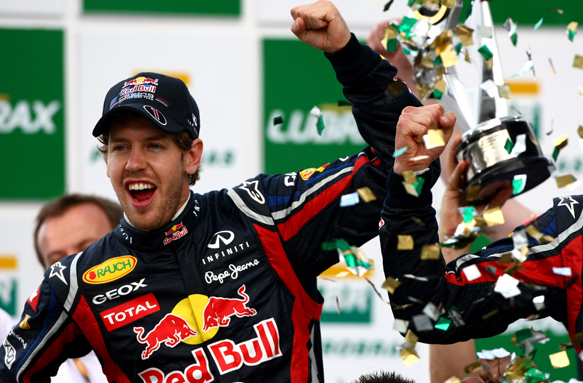
Sebastian Vettel is better than Ayrton Senna.
There, I said it. Many will consider that statement to be sacrilegious, but what we have witnessed during the past two Formula 1 seasons is the emergence of an all-time great.
If you are a 'Vettel doubter', to extend the religious metaphor, then perhaps it's worth reflecting on what we've seen from the 24-year-old German so far in comparison to Senna.
Before proceeding, some caveats. First, while it's not a position I would necessarily agree with, Senna is widely held up as the gold standard for grand prix drivers. As such, the Brazilian is a valid point of comparison. The point of this article is categorically not to discuss Senna's claim to greatness.
Second, there will be no attempt to draw a definitive conclusion. Some argue that comparing drivers of different eras is meaningless, and if your belief is that there's some conceivable way to come up with a definitive answer, that is true.
But looking at the relative strengths and weaknesses of the great drivers allows us to think a little more deeply about their characteristics. As long as you don't take it too seriously, it can be a fascinating process.
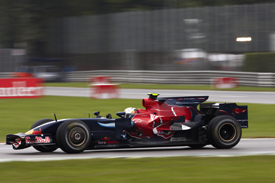
Vettel took his first grand prix win at Monza in 2008 © LAT
Third, it goes without saying that Vettel is a work in progress. The analysis of the German will change and if he slides into obscurity for the next decade, then he will be reassessed.
History will show how Vettel is regarded once he is retired, and we can only go on what we have seen up to the end of 2011.
So, having established the limitations, let's look at the double world champion in more detail.
Qualifying
It's very difficult to separate Vettel and Senna when it comes to sheer one-lap pace, as their records stack up very similarly at comparable stages of their careers.
After 81 races, Vettel has 30 pole positions, two fewer than Senna (up to the 1989 Monaco Grand Prix). Vettel spent 26 of those races in a car that wasn't capable of pole in dry conditions at Toro Rosso in 2006-07, compared to Senna's 15 at Toleman in 1984.
Vettel's average pole position margin this year has been 0.325s, a healthy chunk but hardly symptomatic of a car with so big an advantage that anyone could stick it on pole (as some have tried to characterise the Red Bull RB7 as being). That is a crude indicator that Vettel has had to get close to the maximum potential of the car regularly.
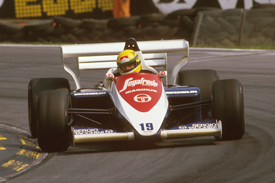 .
.Senna had only 15 races in a non-front-running car, a Toleman, in 1984 © LAT
The McLarens Senna drove from 1988-90 often had a greater advantage than that, even though you do have to take into account that he had to beat Alain Prost in the first two of those seasons.
It's more revealing to look at his first two years at Lotus in 1985-1986, when the car definitely wasn't the best on Sundays, but was very competitive over a single lap. His 15 poles came with an average advantage of 0.480s.
Verdict: Impossible to separate the pair on this score, although the fact that Vettel stands comparison with a driver often recognised as the best qualifier of all says a lot about him.
Racecraft
Vettel was formidable in controlling races from the front in 2011. While others struggled with tyres, strategy and consistency, he so often led from pole position, paced himself to perfection and kept his rivals at arm's length.
He also dispelled the myth that he can't overtake, passing Fernando Alonso on the grass at 160mph+ at Monza and pulling some crucial moves on out-laps in several early-season races.
Vettel proved this year that his racecraft was outstanding, but it's difficult to compare this aspect of his game to Senna without becoming too subjective.
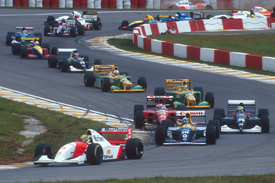
Brazil '93; an example of Senna's racecraft helping beat the dominant Williams' © LAT
However, as a trend, F1 races are now closer at the front than they have been throughout much of grand prix history – and that means Vettel shades it on this front, especially when you take into account his 'Senna at Estoril 1985-esque' win at Monza for Toro Rosso.
Senna's victories were achieved under very different regulations. It's true that in many he had to deal with a multitude of different tyre compounds and also the challenge of managing fuel use during the turbo era. But the fact that he very often had a big car advantage meant that he would have more of a margin to play with than Vettel has had so far.
Of course, he also proved himself in this area with some against-the-odds wins, particularly in 1992 and 1993, when Williams had the advantage, but the modern era of F1 is unquestionably more competitive.
Verdict: Neither driver is lacking here, but Vettel's ability to control a race in a car with a relatively modest pace advantage gives him the edge. Also, despite a few mistakes in previous years, Senna's on-track ethics were, at times, beyond the pale.
Dominance
It's rare for drivers to dominate a season as utterly as Vettel has this year. His 11 wins and 15 pole positions in 19 races is a formidable record.
Again, the closeness of the competition at the front of the field works in his favour and it's difficult to know which of Senna's championships should be considered the most dominant.
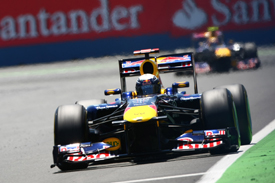
Vettel has hardly given team-mate Mark Webber a look-in in 2011 © LAT
His 1988 season was, in terms of wins, the best with eight in 16 races. That's a 50 per cent win rate compared to Vettel's 58 per cent. Against that, you have to take into account that having Prost as your team-mate is a bigger challenge than Webber.
But the bottom line is that the two championships Senna won after battling with Prost, 1988 and 1990 (when Prost was driving an aerodynamically superior Ferrari), were simply not as emphatic as Vettel's.
And Senna's reliability was comparable, with only three mechanical retirements over the course of those two seasons.
Senna's 1991 championship is an odd one and in terms of the points advantage he had through the year over Nigel Mansell, is his most dominant. But as the McLaren was eclipsed by the Williams FW14 relatively quickly, it wasn't possible to turn in a Vettel-like season.
While Senna's circumstances were never perfect for utter domination, Vettel has managed to do so in a very competitive year by consistently extracting the very best from it and making relatively few mistakes.
Verdict: Vettel again shades this, partly through circumstances and partly through the fact that he has done it in a more competitive era.
Teamwork
Despite the media-amplified problems between Vettel and Webber last year (including the revelation that the Australian was suddenly very keen on having a front wing that he had wanted to discard after practice), the German has never become a polarising figure within Red Bull.
If anything, the way he has worked around the quite legitimate attempts of Webber to assert himself over him, is proof of how Vettel fears no one in the same garage as him.
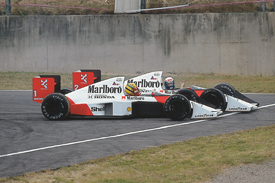
Senna's actions, such as Suzuka in '89, created dischord at McLaren © LAT
It's a matter of record that Senna was capable of creating, or contributing to, discord in the team. The Senna versus Prost rivalry is well documented, but there was also the antagonism at Toleman in 1984 when he signed a deal to switch to Lotus, not to mention his vetoing of Derek Warwick as a team-mate for 1986.
None of that is a huge negative for Senna, but it does suggest a clear need to build a team around his eccentricities. That's not to attack Senna, for he was within his rights to conduct himself however he pleased, but you can expect a smoother ride with Vettel.
Verdict: For team harmony, there's no question that Vettel has the edge.
Ambassadorship
The mythology of Senna has grown over the past 15 years. So much has been written, so many eulogies and platitudes delivered, that it becomes impossible to view him in his proper context.
Jackie Stewart often talks about the responsibility of the world champion to be an ambassador for the sport and while Senna has done much in death to enhance the reputation of F1, in life he provoked a mixed reaction.
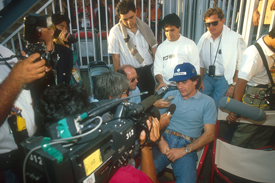
Senna was rarely at ease in interviews, unlike the seemingly carefree Vettel © LAT
There were moments of tremendous dignity and there were moments that were not worthy of a world champion.
Vettel is a different case. Out of the car, he carries his fame with a self-confident, easy charm that allowed him to steal the show at the AUTOSPORT Awards.
Youtube
Forget the image of a petulant, demanding driver – that was a curious creation in some sectors of the media that emerged in 2010. Vettel is the real deal on track and off it.
Verdict: Vettel wins, hands down.
The above is not claimed to be conclusive proof of anything. In statistical terms, Senna still outdoes Vettel in terms of championships, pole positions and wins, and no one doubts the Brazilian's claim to greatness.
But what we can see in Vettel are clear signs of a driver on his way to being one of the legends. Next time you find yourself bored by a runaway Vettel win, remember that you might just be watching a driver who will go down in history as a true great.
After all, it's not impossible he could go on to become the best ever…
© Edd Straw, Autosport.com
http://plus.autosport.com/premium/featu ... han-senna/






